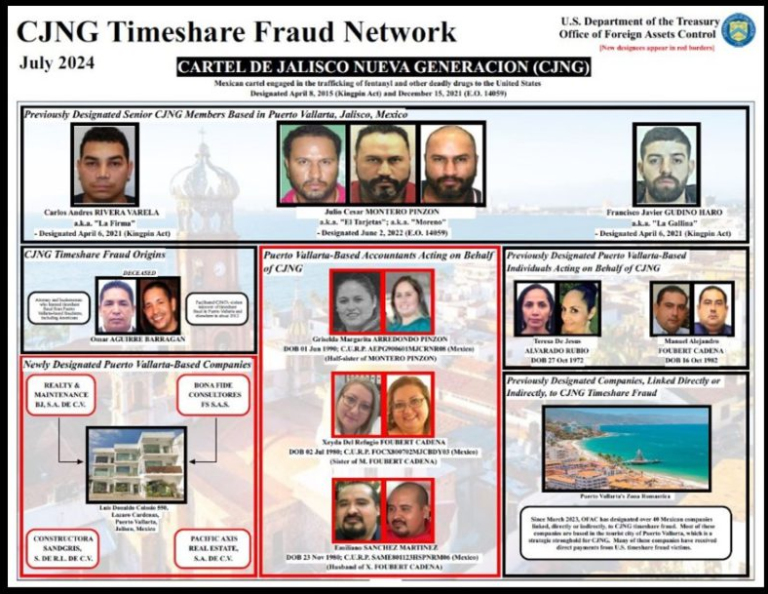The FBI is alerting timeshare owners to a dangerous telemarketing scam tied to a notorious Mexican drug cartel. The scheme preys on owners, tricking them into believing that a buyer is interested in purchasing their property, when in fact, they are being lured into a sophisticated scam operation. One such heartbreaking case is that of the Dimitruks, a retired couple from Ontario, Canada, who lost over $50,000 to this scam.
How the Scam Unfolded
In late 2022, the Dimitruks received a call from a man who seemed to know the specifics of their timeshare in Florida. The caller claimed to have a buyer from Mexico willing to purchase their property for more than it was worth. The offer sounded legitimate, but the couple still owed $5,000 on their timeshare. The scammer assured them this wouldn’t be a problem, convincing the Dimitruks to proceed with the sale.
The scammers posed as employees of an escrow company and sent forms to make everything appear official. But after signing the documents, the Dimitruks were asked to wire $3,000 to cover “administrative” and “processing” fees. The financial demands continued for months. “They kept calling me after that saying, ‘Hey your money is waiting for you here,’” Mr. Dimitruk, a 73-year-old retired truck driver, recalled. “They said, ‘We’re going to get in trouble if the money isn’t returned to you,’ and gave me a toll-free number to call them at.”

In the end, the couple lost over $50,000. Despite their growing doubts, they were strung along with reassurances. One scammer admitted they had some “bad employees” but claimed they had been fired. “Near the end of the call, he said, ‘You’ve been dealing with some bad people and we fired all those bad guys,’” Dimitruk said. “So they were like, yeah it’s all good. You can go ahead and pay us more and we’ll send you your money.”
A Growing and Dangerous Scam
Unfortunately, the Dimitruks’ experience is far from unique. The FBI recently connected this type of timeshare fraud to the Jalisco New Generation Cartel, one of the most violent criminal organizations in Mexico. In July 2024, the FBI and the Treasury Department’s Financial Crimes Enforcement Network (FinCEN) issued a stark warning. They reported that the cartel is behind many telemarketing schemes targeting U.S. timeshare owners, using the profits to fund other illegal activities, including drug trafficking.
“Mexico-based [transnational criminal organizations] such as the Jalisco New Generation Cartel are increasingly targeting U.S. owners of timeshares in Mexico through complex and often yearslong telemarketing, impersonation, and advance fee schemes,” the FBI’s statement read. These scams generate illicit funds that finance other criminal enterprises, such as manufacturing and trafficking synthetic drugs like fentanyl into the U.S.

Many of these scams involve phony real estate and escrow companies. The Dimitruks dealt with one called ecurrencyescrow[.]llc, which has since gone offline. However, this company was linked to dozens of other suspicious websites, many of which mimic legitimate real estate firms, tricking victims into trusting the scam.
The Hidden Fear: Cartel Involvement
The involvement of a violent drug cartel adds an even more chilling aspect to these scams. In some cases, those involved fear for their safety. Last year, it was reported that eight young workers at a cartel-run call center were killed after trying to leave their jobs. Victims often avoid reporting the crime, either out of embarrassment or fear of reprisal from the criminals involved.
William Dimitruk admitted that he and his wife haven’t yet reported their loss to the police. However, he is reconsidering it after acknowledging that doing so could prevent others from being scammed. “It could help someone else not go through what we did,” he said.
Protecting Yourself from Timeshare Scams
Timeshare owners must be extra cautious when receiving unsolicited offers to buy their properties. Scammers can be convincing, and they often have access to specific details about a property that make their offers seem legitimate. Here are some tips to avoid falling victim to these scams:
1. Verify the Buyer
Always independently verify any potential buyer or broker offering to purchase your timeshare. Do not rely solely on the information provided by the caller.
2. Beware of Upfront Fees
Legitimate real estate transactions typically do not require large upfront payments for processing, administrative fees, or taxes.
3. Use Trusted Professionals
Work with a licensed real estate agent or lawyer when dealing with timeshare sales, and be wary of companies you haven’t independently vetted.
4. Contact Authorities
If you believe a scam has targeted you, report it to local authorities and the FBI. While investigations can take years, filing a report could help prevent others from becoming victims and may increase your chances of recovering stolen funds.
The Importance of Reporting
Even though the Dimitruks have yet to file a police report, they are considering doing so to help prevent future scams. Reporting these crimes is crucial for authorities to track down these criminal networks. Sometimes, government agencies can recover stolen funds and redistribute them to the victims, but this can only happen if victims report their losses.
Scams like this one are not just about financial loss; they fund dangerous criminal enterprises, further victimizing society. By spreading awareness and encouraging people to be vigilant, we can help combat these sophisticated schemes.
In conclusion, timeshare owners should remain cautious and alert, particularly when receiving unsolicited offers. The scam targeting the Dimitruks shows that no one is immune to these deceptive tactics, but through awareness and precaution, we can help reduce the number of victims falling prey to these dangerous schemes.




